翻译材料7-1
新视界大学英语第二册翻译答案-unit-1-7-中译英
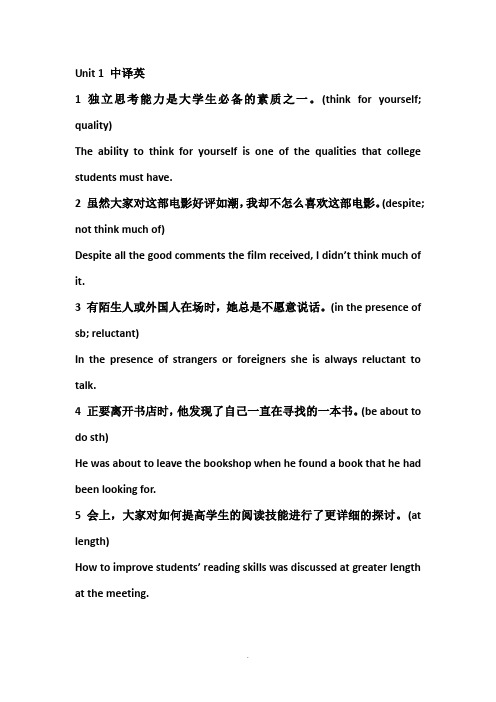
Unit 1 中译英1 独立思考能力是大学生必备的素质之一。
(think for yourself; quality)The ability to think for yourself is one of the qualities that college students must have.2 虽然大家对这部电影好评如潮,我却不怎么喜欢这部电影。
(despite; not think much of)Despite all the good comments the film receive d, I didn’t think much of it.3 有陌生人或外国人在场时,她总是不愿意说话。
(in the presence of sb; reluctant)In the presence of strangers or foreigners she is always reluctant to talk.4 正要离开书店时,他发现了自己一直在寻找的一本书。
(be about to do sth)He was about to leave the bookshop when he found a book that he had been looking for.5 会上,大家对如何提高学生的阅读技能进行了更详细的探讨。
(at length)How to improve students’ reading skills was discussed at greater length at the meeting.Unit 2 中译英1 虽然体育运动的形式多种多样,但它们有一个共同之处:所有的运动都是为了增强人们的体质。
(despite; have … in common)Despite the different forms of sports, they have one thing in common: All of them are to strengthen people’s health.2 四年一次的奥运会对促进各国间的友谊起着重要作用。
新视野大学英语第二版Unit1-7原文+课后翻译
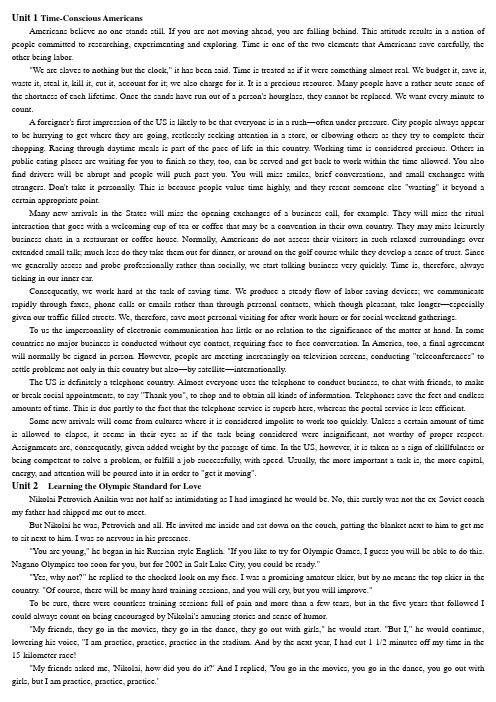
Unit 1 Time-Conscious AmericansAmericans believe no one stands still. If you are not moving ahead, you are falling behind. This attitude results in a nation of people committed to researching, experimenting and exploring. Time is one of the two elements that Americans save carefully, the other being labor."We are slaves to nothing but the clock," it has been said. Time is treated as if it were something almost real. We budget it, save it, waste it, steal it, kill it, cut it, account for it; we also charge for it. It is a precious resource. Many people have a rather acute sense of the shortness of each lifetime. Once the sands have run out of a person's hourglass, they cannot be replaced. We want every minute to count.A foreigner's first impression of the US is likely to be that everyone is in a rush—often under pressure. City people always appear to be hurrying to get where they are going, restlessly seeking attention in a store, or elbowing others as they try to complete their shopping. Racing through daytime meals is part of the pace of life in this country. Working time is considered precious. Others in public eating-places are waiting for you to finish so they, too, can be served and get back to work within the time allowed. You also find drivers will be abrupt and people will push past you. You will miss smiles, brief conversations, and small exchanges with strangers. Don't take it personally. This is because people value time highly, and they resent someone else "wasting" it beyond a certain appropriate point.Many new arrivals in the States will miss the opening exchanges of a business call, for example. They will miss the ritual interaction that goes with a welcoming cup of tea or coffee that may be a convention in their own country. They may miss leisurely business chats in a restaurant or coffee house. Normally, Americans do not assess their visitors in such relaxed surroundings over extended small talk; much less do they take them out for dinner, or around on the golf course while they develop a sense of trust. Since we generally assess and probe professionally rather than socially, we start talking business very quickly. Time is, therefore, always ticking in our inner ear.Consequently, we work hard at the task of saving time. We produce a steady flow of labor-saving devices; we communicate rapidly through faxes, phone calls or emails rather than through personal contacts, which though pleasant, take longer—especially given our traffic-filled streets. We, therefore, save most personal visiting for after-work hours or for social weekend gatherings.To us the impersonality of electronic communication has little or no relation to the significance of the matter at hand. In some countries no major business is conducted without eye contact, requiring face-to-face conversation. In America, too, a final agreement will normally be signed in person. However, people are meeting increasingly on television screens, conducting "teleconferences" to settle problems not only in this country but also—by satellite—internationally.The US is definitely a telephone country. Almost everyone uses the telephone to conduct business, to chat with friends, to make or break social appointments, to say "Thank you", to shop and to obtain all kinds of information. Telephones save the feet and endless amounts of time. This is due partly to the fact that the telephone service is superb here, whereas the postal service is less efficient.Some new arrivals will come from cultures where it is considered impolite to work too quickly. Unless a certain amount of time is allowed to elapse, it seems in their eyes as if the task being considered were insignificant, not worthy of proper respect. Assignments are, consequently, given added weight by the passage of time. In the US, however, it is taken as a sign of skillfulness or being competent to solve a problem, or fulfill a job successfully, with speed. Usually, the more important a task is, the more capital, energy, and attention will be poured into it in order to "get it moving".Unit 2 Learning the Olympic Standard for LoveNikolai Petrovich Anikin was not half as intimidating as I had imagined he would be. No, this surely was not the ex-Soviet coach my father had shipped me out to meet.But Nikolai he was, Petrovich and all. He invited me inside and sat down on the couch, patting the blanket next to him to get me to sit next to him. I was so nervous in his presence."You are young," he began in his Russian-style English. "If you like to try for Olympic Games, I guess you will be able to do this. Nagano Olympics too soon for you, but for 2002 in Salt Lake City, you could be ready.""Yes, why not?" he replied to the shocked look on my face. I was a promising amateur skier, but by no means the top skier in the country. "Of course, there will be many hard training sessions, and you will cry, but you will improve."To be sure, there were countless training sessions full of pain and more than a few tears, but in the five years that followed I could always count on being encouraged by Nikolai's amusing stories and sense of humor."My friends, they go in the movies, they go in the dance, they go out with girls," he would start. "But I," he would continue, lowering his voice, "I am practice, practice, practice in the stadium. And by the next year, I had cut 1-1/2 minutes off my time in the 15-kilometer race!"My friends asked me, 'Nikolai, how did you do it?' And I replied, 'You go in the movies, you go in the dance, you go out with girls, but I am practice, practice, practice.'Here the story usually ended, but on one occasion, which we later learned was his 25th wedding anniversary, he stood proudly in a worn woolen sweater and smiled and whispered, "And I tell you, I am 26 years old before I ever kiss a girl! She was the woman I later marry."Romantic and otherwise, Nikolai knew love. His consistent good humor, quiet gratitude, perceptivity, and sincerity set an Olympic standard for love that I continue to reach for, even though my skiing days are over.Still, he never babied me. One February day I had a massive headache and felt quite fatigued. I came upon him in a clearing, and after approximately 15 minutes of striding into the cold breeze over the white powder to catch him, I fussed, "Oh, Nikolai, I feel like I am going to die.""When you are a hundred years old, everybody dies," he said, indifferent to my pain. "But now," he continued firmly. "Now must be ski, ski, ski."And, on skis, I did what he said. On other matters, though, I was rebellious. Once, he packed 10 of us into a Finnish bachelor's tiny home for a low-budget ski camp. We awoke the first morning to find Nikolai making breakfast and then made quick work with our spoons while sitting on makeshift chairs around a tiny card table. When we were finished, Nikolai stacked the sticky bowls in front of my sole female teammate and me, asserting, "Now, girls do dishes!"I threw my napkin on the floor and swore at him, "Ask the damn boys! This is unfair." He never asked this of me again, nor did he take much notice of my outburst. He saved his passion for skiing.When coaching, he would sing out his instructions keeping rhythm with our stride: "Yes, yes, one-two-three, one-two-three." A dear lady friend of my grandfather, after viewing a copy of a video of me training with Nikolai, asked, "Does he also teach dance?"In training, I worked without rest to correct mistakes that Nikolai pointed out and I asked after each pass if it was better."Yes, it's OK. But the faster knee down, the better.""But is it fast enough?" I'd persist.Finally he would frown and say, "Billion times you make motion—then be perfect," reminding me in an I've-told-you-a-billion-times tone, "You must be patient."Nikolai's patience and my hard work earned me a fourth-place national ranking heading into the pre-Olympic season, but then I missed the cut for the 2002 Olympics.Last summer, I returned to visit Nikolai. He made me tea... and did the dishes! We talked while sitting on his couch. Missing the Olympic Team the previous year had made me pause and reflect on what I had gained—not the least of which was a quiet, indissoluble bond with a short man in a tropical shirt.Nikolai taught me to have the courage, heart, and discipline to persist, even if it takes a billion tries. He taught me to be thankful in advance for a century of life on earth, and to remind myself every day that despite the challenges at hand, "Now must be love, love, love."Unit3Marriage Across the NationsGail and I imagined a quiet wedding. During our two years together we had experienced the usual ups and downs of a couple learning to know, understand, and respect each other. But through it all we had honestly confronted the weaknesses and strengths of each other's characters.Our racial and cultural differences enhanced our relationship and taught us a great deal about tolerance, compromise, and being open with each other. Gail sometimes wondered why I and other blacks were so involved with the racial issue, and I was surprised that she seemed to forget the subtler forms of racial hatred in American society.Gail and I had no illusions about what the future held for us as a married, mixed couple in America. The continual source of our strength was our mutual trust and respect.We wanted to avoid the mistake made by many couples of marrying for the wrong reasons, and only finding out ten, twenty, or thirty years later that they were incompatible, that they hardly took the time to know each other, that they overlooked serious personality conflicts in the expectation that marriage was an automatic way to make everything work out right. That point was emphasized by the fact that Gail's parents, after thirty-five years of marriage, were going through a bitter and painful divorce, which had destroyed Gail and for a time had a negative effect on our budding relationship.When Gail spread the news of our wedding plans to her family she met with some resistance. Her mother, Deborah, all along had been supportive of our relationship, and even joked about when we were going to get married so she could have grandchildren. Instead of congratulations upon hearing our news, Deborah counseled Gail to be really sure she was doing the right thing."So it was all right for me to date him, but it's wrong for me to marry him. Is his color the problem, Mom?" Gail subsequently told me she had asked her mother."To start with I must admit that at first I harbored reservations about a mixed marriage, prejudices you might even call them. But when I met Mark I found him a charming and intelligent young guy. Any mother would be proud to have him for a son-in-law. So,color has nothing to do with it. Yes, my friends talk. Some even express shock at what you're doing. But they live in a different world. So you see, Mark's color is not the problem. My biggest worry is that you may be marrying Mark for the same wrong reasons that I married your father. When we met I saw him as my beloved, intelligent, charming, and caring. It was all so new, all so exciting, and we both thought, on the surface at least, that ours was an ideal marriage with every indication that it would last forever. I realized only later that I didn't know my beloved, your father, very well when we married.""But Mark and I have been together more than two years," Gail railed. "We've been through so much together. We've seen each other at our worst many times. I'm sure that time will only confirm what we feel deeply about each other.""You may be right. But I still think that waiting won't hurt. You're only twenty-five."Gail's father, David, whom I had not yet met personally, approached our decision with a father-knows-best attitude. He basically asked the same questions as Gail's mother: "Why the haste? Who is this Mark? What's his citizenship status?" And when he learned of my problems with the Citizenship department, he immediately suspected that I was marrying his daughter in order to remain in the United States."But Dad, that's harsh," Gail said."Then why the rush? Buy time, buy time," he remarked repeatedly."Mark has had problems with citizenship before and has always taken care of them himself," Gail defended." In fact, he made it very clear when we were discussing marriage that if I had any doubts about anything, I should not hesitate to cancel our plans."Her father proceeded to quote statistics showing that mixed couples had higher divorce rates than couples of the same race and gave examples of mixed couples he had counseled who were having marital difficulties."Have you thought about the hardships your children would go through?" he asked."Dad, are you a racist?""No, of course not. But you have to be realistic.""Maybe our children will have some problems, but whose children don't? But one thing they'll always have: our love and devotion.""That's idealistic. People can be very cruel toward children from mixed marriages.""Dad, we'll worry about that when the time comes. If we had to resolve all doubt before we acted, very little would ever get done.""Remember, it's never too late to change your mind."Unit 4 A Test of True LoveSix minutes to six, said the digital clock over the information desk in Grand Central Station. John Blandford, a tall young army officer, focused his eyesight on the clock to note the exact time. In six minutes he would see the woman who had filled a special place in his life for the past thirteen months, a woman he had never seen, yet whose written words had been with him and had given him strength without fail.Soon after he volunteered for military service, he had received a book from this woman. A letter, which wished him courage and safety, came with the book. He discovered that many of his friends, also in the army, had received the identical book from the woman, Hollis Meynell. And while they all got strength from it, and appreciated her support of their cause, John Blandford was the only person to write Ms. Meynell back. On the day of his departure, to a destination overseas where he would fight in the war, he received her reply. Aboard the cargo ship that was taking him into enemy territory, he stood on the deck and read her letter to him again and again.For thirteen months, she had faithfully written to him. When his letters did not arrive, she wrote anyway, without decrease. During the difficult days of war, her letters nourished him and gave him courage. As long as he received letters from her, he felt as though he could survive. After a short time, he believed he loved her, and she loved him. It was as if fate had brought them together.But when he asked her for a photo, she declined his request. She explained her objection: "If your feelings for me have any reality, any honest basis, what I look like won't matter. Suppose I'm beautiful. I'd always be bothered by the feeling that you loved me for my beauty, and that kind of love would disgust me. Suppose I'm plain. Then I'd always fear you were writing to me only because you were lonely and had no one else. Either way, I would forbid myself from loving you. When you come to New York and you see me, then you can make your decision. Remember, both of us are free to stop or to go on after that—if that's what we choose..."One minute to six... Blandford's heart leaped.A young woman was coming toward him, and he felt a connection with her right away. Her figure was long and thin, her spectacular golden hair lay back in curls from her small ears. Her eyes were blue flowers; her lips had a gentle firmness. In her fancy green suit she was like springtime come alive.He started toward her, entirely forgetting to notice that she wasn't wearing a rose, and as he moved, a small, warm smile formed on her lips."Going my way, soldier?" she asked.Uncontrollably, he made one step closer to her. Then he saw Hollis Meynell.She was standing almost directly behind the girl, a woman well past forty, and a fossil to his young eyes, her hair sporting patches of gray. She was more than fat; her thick legs shook as they moved. But she wore a red rose on her brown coat.The girl in the green suit was walking quickly away and soon vanished into the fog. Blandford felt as though his heart was being compressed into a small cement ball, so strong was his desire to follow the girl, yet so deep was his longing for the woman whose spirit had truly companioned and brought warmth to his own; and there she stood. Her pale, fat face was gentle and intelligent; he could see that now. Her gray eyes had a warm, kindly look.Blandford resisted the urge to follow the younger woman, though it was not easy to do so. His fingers held the book she had sent to him before he went off to the war, which was to identify him to Hollis Meynell. This would not be love. However, it would be something precious, something perhaps even less common than love—a friendship for which he had been, and would always be, thankful.He held the book out toward the woman."I'm John Blandford, and you—you are Ms. Meynell. I'm so glad you could meet me. May I take you to dinner?" The woman smiled. "I don't know what this is all about, son," she answered. "That young lady in the green suit—the one who just went by—begged me to wear this rose on my coat. And she said that if you asked me to go out with you, I should tell you that she's waiting for you in that big restaurant near the highway. She said it was some kind of a test."Unit5 Weeping for My Smoking DaughterMy daughter smokes. While she is doing her homework, her feet on the bench in front of her and her calculator clicking out answ ers to her geometry problems, I am looking at the half-empty package of Camels tossed carelessly close at hand. I pick them up, take t hem into the kitchen, where the light is better, and study them -- they are filtered, for which I am grateful. My heart feels terrible. I wa nt to weep. In fact, I do weep a little, standing there by the stove holding one of the instruments, so white, so precisely rolled, that coul d cause my daughter's death. When she smoked Marlboros and Players I hardened myself against feeling so bad; nobody I knew ever s moked these brands.She doesn't know this, but it was Camels that my father, her grandfather, smoked. But before he smoked cigarettes made by manu facturers -- when he was very young and very poor, with glowing eyes -- he smoked Prince Albert tobacco in cigarettes he rolled hims elf. I remember the bright-red tobacco tin, with a picture of Queen Victoria's partner, Prince Albert, dressed in a black dress coat and c arrying a cane .By the late forties and early fifties no one rolled his own anymore (and few women smoked) in my hometown of Eatonton, Georg ia. The tobacco industry, coupled with Hollywood movies in which both male and female heroes smoked like chimneys, completely w on over people like my father, who were hopelessly hooked by cigarettes. He never looked as fashionable as Prince Albert, though; he continued to look like a poor, overweight, hard working colored man with too large a family, black, with a very white cigarette stuck i n his mouth.I do not remember when he started to cough. Perhaps it was unnoticeable at first, a little coughing in the morning as he lit his first cigarette upon getting out of bed. By the time I was sixteen, my daughter's age, his breath was a wheeze, embarrassing to hear; he cou ld not climb stairs without resting every third or fourth step. It was not unusual for him to cough for an hour.My father died from "the poor man's friend", pneumonia, one hard winter when his lung illnesses had left him low. I doubt he had much lung left at all, after coughing for so many years. He had so little breath that, during his last years, he was always leaning on som ething. I remembered once, at a family reunion, when my daughter was two, that my father picked her up for a minute -- long enough for me to photograph them -- but the effort was obvious. Near the very end of his life, and largely because he had no more lungs, he qu it smoking. He gained a couple of pounds, but by then he was so slim that no one noticed.When I travel to Third World countries I see many people like my father and daughter. There are large advertisement signs directe d at them both: the tough, confident or fashionable older man, the beautiful, "worldly" young woman, both dragging away. In these po or countries, as in American inner cities and on reservations, money that should be spent for food goes instead to the tobacco compani es; over time, people starve themselves of both food and air, effectively weakening and hooking their children, eventually killing them selves. I read in the newspaper and in my gardening magazine that the ends of cigarettes are so poisonous that if a baby swallows one, it is likely to die, and that the boiled water from a bunch of them makes an effective insecticide.There is a deep hurt that I feel as a mother. Some days it is a feeling of uselessness. I remember how carefully I ate when I was pr egnant, how patiently I taught my daughter how to cross a street safely. For what, I sometimes wonder; so that she can struggle to brea the through most of her life feeling half her strength, and then die of self-poisoning, as her grandfather did?There is a quotation from a battered women's shelter that I especially like: "Peace on earth begins at home." I believe everything d oes. I think of a quotation for people trying to stop smoking: "Every home is a no smoking zone." Smoking is a form of self-battering that also batters those who must sit by, occasionally joke or complain, and helplessly watch. I realize now that as a child I sat by, throu gh the years, and literally watched my father kill himself: surely one such victory in my family, for the prosperous leaders who own th e tobacco companies, is enoughUnit 6 As His Name Is, So Is He!For her first twenty-four years, she'd been known as Debbie—a name that didn't suit her good looks and elegant manner. "My name has always made me think I should be a cook," she complained. "I just don't feel like a Debbie."One day, while filling out an application form for a publishing job, the young woman impulsively substituted her middle name, Lynne, for her first name Debbie. "That was the smartest thing I ever did," she says now. "As soon as I stopped calling myself Debbie, I felt more comfortable with myself... and other people started to take me more seriously." Two years after her successful job interview, the former waitress is now a successful magazine editor. Friends and associates call her Lynne.Naturally, the name change didn't cause Debbie/Lynne's professional achievement—but it surely helped if only by adding a bit of self-confidence to her talents. Social scientists say that what you're called can affect your life. Throughout history, names have not merely identified people but also described them. "As his name is, so is he." says the Bible, and Webster's Dictionary includes the following definition of name: "a word or words expressing some quality considered characteristic or descriptive of a person or a thing, often expressing approval or disapproval". Note well "approval or disapproval". For better or worse, qualities such as friendliness or reserve, plainness or charm may be suggested by your name and conveyed to other people before they even meet you.Names become attached to specific images, as anyone who's been called "a plain Jane" or "just an average Joe" can show. The latter name particularly bothers me since my name is Joe, which some think makes me more qualified to be a baseball player than, say, an art critic. Yet, despite this disadvantage, I did manage to become an art critic for a time. Even so, one prominent magazine consistently refused to print "Joe" in my by-line, using my first initials, J. S., instead. I suspect that if I were a more refined Arthur or Adrian, the name would have appeared complete.Of course, names with a positive sense can work for you and even encourage new acquaintances. A recent survey showed that American men thought Susan to be the most attractive female name, while women believed Richard and David were the most attractive for men. One woman I know turned down a blind date with a man named Harry because "he sounded dull". Several evenings later, she came up to me at a party, pressing for an introduction to a very impressive man; they'd been exchanging glances all evening. "Oh," I said. "You mean Harry." She was ill at ease.Though most of us would like to think ourselves free from such prejudiced notions, we're all guilty of name stereotyping to some extent. Confess: Wouldn't you be surprised to meet a carpenter named Nigel? A physicist named Bertha? A Pope Mel? Often, we project name-based stereotypes on people, as one woman friend discovered while taking charge of a nursery school's group of four-year-olds. "There I was, trying to get a little active boy named Julian to sit quietly and read a book—and pushing a thoughtful creature named Rory to play ball. I had their personalities confused because of their names!"Apparently, such prejudices can affect classroom achievement as well. In a study conducted by Herbert Harari of San Diego State University, and John McDavid of Georgia State University, teachers gave consistently lower grades on essays apparently written by boys named Elmer and Hubert than they awarded to the same papers when the writers' names were given as Michael and David. However, teacher prejudice isn't the only source of classroom difference. Dr. Thomas V. Busse and Louisa Seraydarian of Temple University found those girls with names such as Linda, Diane, Barbara, Carol, and Cindy performed better on objectively graded IQ and achievement tests than did girls with less appealing names. (A companion study showed girls' popularity with their peers was also related to the popularity of their names―although the connection was less clear for boys.)Though your parents probably meant your name to last a lifetime, remember that when they picked it they'd hardly met you, and the hopes and dreams they valued when they chose it may not match yours. If your name no longer seems to fit you, don't despair; you aren't stuck with the label. Movie stars regularly change their names, and with some determination, you can, too.Unit 7 Lighten Your Load and Save Your LifeIf you often feel angry and overwhelmed, like the stress in your life is spinning out of control, then you may be hurting your heart.If you don't want to break your own heart, you need to learn to take charge of your life where you can—and recognize there are many things beyond your control.So says Dr. Robert S. Eliot, author of a new book titled From Stress to Strength: How to Lighten Your Load and Save Your Life. He's a clinical professor of medicine at the University of Nebraska.Eliot says there are people in this world that he calls "hot reactors". For these people, being tense may cause tremendous and rapid increases in their blood pressure.Eliot says researchers have found that stressed people have higher cholesterol levels, among other things. "We've done years of work in showing that excess alarm or stress chemicals can literally burst heart muscle fibers. When that happens it happens very。
典范英语7-1中英文对照翻译 Walrus Joins In
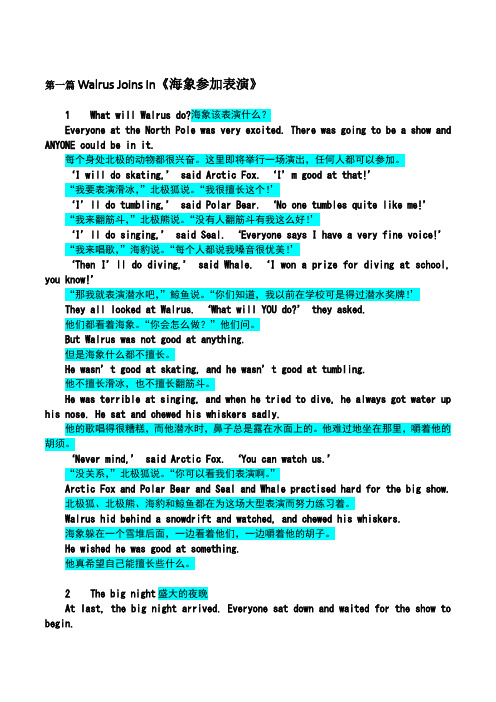
第一篇Walrus Joins In《海象参加表演》1What will Walrus do?海象该表演什么?Everyone at the North Pole was very excited. There was going to be a show and ANYONE could be in it.每个身处北极的动物都很兴奋。
这里即将举行一场演出,任何人都可以参加。
‘I will do skating,’ said Arctic Fox. ‘I’m good at that!’“我要表演滑冰,”北极狐说。
“我很擅长这个!’‘I’ll do tumbling,’ said Polar Bear. ‘No one tumbles quite like me!’“我来翻筋斗,”北极熊说。
“没有人翻筋斗有我这么好!’‘I’ll do singing,’ said Seal. ‘Everyone says I have a very fine voice!’“我来唱歌,”海豹说。
“每个人都说我嗓音很优美!’‘Then I’ll do diving,’ said Whale. ‘I won a prize for diving at school, you know!’“那我就表演潜水吧,”鲸鱼说。
“你们知道,我以前在学校可是得过潜水奖牌!’They all looked at Walrus. ‘What will YOU do?’ they asked.他们都看着海象。
“你会怎么做?”他们问。
But Walrus was not good at anything.但是海象什么都不擅长。
He wasn’t good at skating, and he wasn’t good at tumbling.他不擅长滑冰,也不擅长翻筋斗。
He was terrible at singing, and when he tried to dive, he always got water up his nose. He sat and chewed his whiskers sadly.他的歌唱得很糟糕,而他潜水时,鼻子总是露在水面上的。
科技英语课文翻译1-7
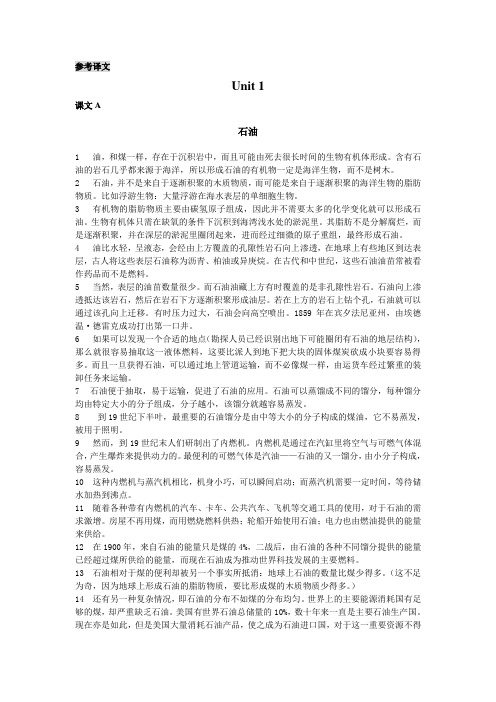
参考译文Unit 1课文A石油1油,和煤一样,存在于沉积岩中,而且可能由死去很长时间的生物有机体形成。
含有石油的岩石几乎都来源于海洋,所以形成石油的有机物一定是海洋生物,而不是树木。
2 石油,并不是来自于逐渐积聚的木质物质,而可能是来自于逐渐积聚的海洋生物的脂肪物质。
比如浮游生物:大量浮游在海水表层的单细胞生物。
3 有机物的脂肪物质主要由碳氢原子组成,因此并不需要太多的化学变化就可以形成石油。
生物有机体只需在缺氧的条件下沉积到海湾浅水处的淤泥里。
其脂肪不是分解腐烂,而是逐渐积聚,并在深层的淤泥里圈闭起来,进而经过细微的原子重组,最终形成石油。
4 油比水轻,呈液态,会经由上方覆盖的孔隙性岩石向上渗透,在地球上有些地区到达表层,古人将这些表层石油称为沥青、柏油或异庚烷。
在古代和中世纪,这些石油油苗常被看作药品而不是燃料。
5 当然,表层的油苗数量很少。
而石油油藏上方有时覆盖的是非孔隙性岩石。
石油向上渗透抵达该岩石,然后在岩石下方逐渐积聚形成油层。
若在上方的岩石上钻个孔,石油就可以通过该孔向上迁移。
有时压力过大,石油会向高空喷出。
1859年在宾夕法尼亚州,由埃德温·德雷克成功打出第一口井。
6 如果可以发现一个合适的地点(勘探人员已经识别出地下可能圈闭有石油的地层结构),那么就很容易抽取这一液体燃料,这要比派人到地下把大块的固体煤炭砍成小块要容易得多。
而且一旦获得石油,可以通过地上管道运输,而不必像煤一样,由运货车经过繁重的装卸任务来运输。
7 石油便于抽取,易于运输,促进了石油的应用。
石油可以蒸馏成不同的馏分,每种馏分均由特定大小的分子组成,分子越小,该馏分就越容易蒸发。
8 到19世纪下半叶,最重要的石油馏分是由中等大小的分子构成的煤油,它不易蒸发,被用于照明。
9 然而,到19世纪末人们研制出了内燃机。
内燃机是通过在汽缸里将空气与可燃气体混合,产生爆炸来提供动力的。
最便利的可燃气体是汽油——石油的又一馏分,由小分子构成,容易蒸发。
典范英语7-1海象参加表演翻译
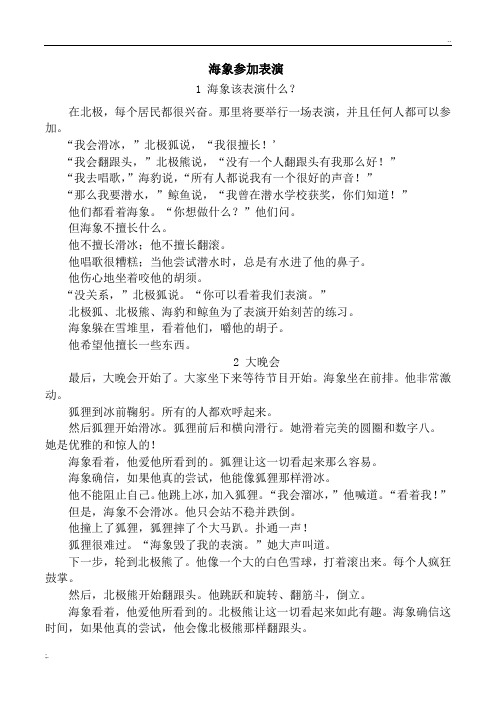
海象参加表演1 海象该表演什么?在北极,每个居民都很兴奋。
那里将要举行一场表演,并且任何人都可以参加。
“我会滑冰,”北极狐说,“我很擅长!'“我会翻跟头,”北极熊说,“没有一个人翻跟头有我那么好!”“我去唱歌,”海豹说,“所有人都说我有一个很好的声音!”“那么我要潜水,”鲸鱼说,“我曾在潜水学校获奖,你们知道!”他们都看着海象。
“你想做什么?”他们问。
但海象不擅长什么。
他不擅长滑冰;他不擅长翻滚。
他唱歌很糟糕;当他尝试潜水时,总是有水进了他的鼻子。
他伤心地坐着咬他的胡须。
“没关系,”北极狐说。
“你可以看着我们表演。
”北极狐、北极熊、海豹和鲸鱼为了表演开始刻苦的练习。
海象躲在雪堆里,看着他们,嚼他的胡子。
他希望他擅长一些东西。
2 大晚会最后,大晚会开始了。
大家坐下来等待节目开始。
海象坐在前排。
他非常激动。
狐狸到冰前鞠躬。
所有的人都欢呼起来。
然后狐狸开始滑冰。
狐狸前后和横向滑行。
她滑着完美的圆圈和数字八。
她是优雅的和惊人的!海象看着,他爱他所看到的。
狐狸让这一切看起来那么容易。
海象确信,如果他真的尝试,他能像狐狸那样滑冰。
他不能阻止自己。
他跳上冰,加入狐狸。
“我会溜冰,”他喊道。
“看着我!”但是,海象不会滑冰。
他只会站不稳并跌倒。
他撞上了狐狸,狐狸摔了个大马趴。
扑通一声!狐狸很难过。
“海象毁了我的表演。
”她大声叫道。
下一步,轮到北极熊了。
他像一个大的白色雪球,打着滚出来。
每个人疯狂鼓掌。
然后,北极熊开始翻跟头。
他跳跃和旋转、翻筋斗,倒立。
海象看着,他爱他所看到的。
北极熊让这一切看起来如此有趣。
海象确信这时间,如果他真的尝试,他会像北极熊那样翻跟头。
突然,海象不能停下来,他跳到冰上。
“我也会翻跟头,”他喊道。
“看着我!”但是,海象不擅长翻跟头。
他只会站不稳并跌倒。
他绊倒了北极熊,哗啦一声摔倒了!当然,北极熊很生气。
“海象毁了我的表演,”他大声喊道。
3 越来越差下面是海豹的表演。
她瞪了海象一眼,于是她开始唱:“啊,我的心情多么高兴当我看到北极光。
笔译第七周WhyIWantaWife全文翻译说课材料

笔译第七周WhyIWantaWife全⽂翻译说课材料笔译第七周W h y I W a n t a W i f e全⽂翻译I belong to that classification of people known as wives. I am A Wife.我属于⼈们称为妻⼦的那⼀类⼈,我是⼀个妻⼦。
And, not altogether incidentally, I am a mother.⽽且,并⾮偶然,我还是⼀个母亲。
1) Not too long ago a male friend of mine appeared on the scene fresh from a recent divorce.不久之前,我的⼀位男性朋友离婚了。
2) He had one child, who is, of course, with his ex-wife. He is looking for another wife.他有⼀个孩⼦,当然,这个孩⼦跟随他的前妻⽣活。
他正在寻找⼀位新的妻⼦。
3) As I thought about him while I was ironing one evening, it suddenly occurred to me that I too, would like to have a wife.有⼀天晚上,当我在熨⾐服的时候,我想起了他,我突然想到,我也想要⼀位妻⼦。
Why do I want a wife?我为什么希望有个妻⼦呢?4) I would like to go back to school so that I can become economically independent, support myself, and if need be, support those dependent upon me.我想回学校继续学习,然后我就可以在经济上独⽴,养活⾃⼰,⽽且如果需要的话,养活那些依靠我⽣活的⼈。
句子翻译绿色单词chapter 1--7
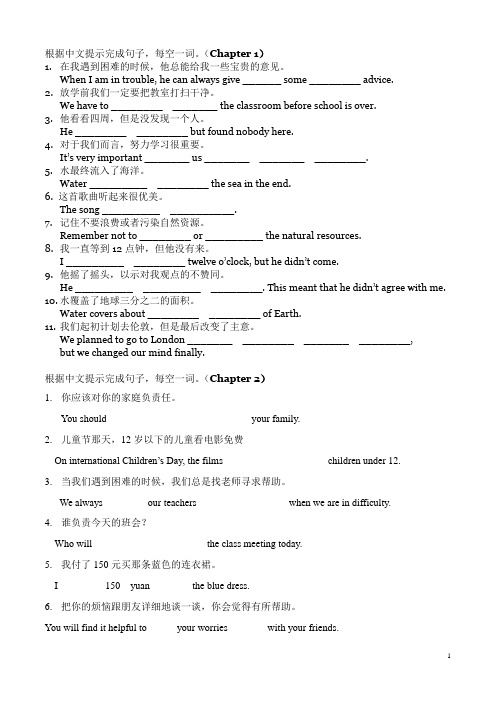
根据中文提示完成句子,每空一词。
(Chapter 1)1.在我遇到困难的时候,他总能给我一些宝贵的意见。
When I am in trouble, he can always give ______ some ________ advice.2.放学前我们一定要把教室打扫干净。
We have to ________ _______ the classroom before school is over.3.他看看四周,但是没发现一个人。
He ________ ________ but found nobody here.4.对于我们而言,努力学习很重要。
It’s very important _______ us _______ _______ ________.5.水最终流入了海洋。
Water _________ ________ the sea in the end.6. 这首歌曲听起来很优美。
The song _________ __________.7.记住不要浪费或者污染自然资源。
Remember not to ________ or _________ the natural resources.8.我一直等到12点钟,但他没有来。
I _________ ________ twelve o’clock, but he didn’t come.9.他摇了摇头,以示对我观点的不赞同。
He _________ _________ ________. This meant that he didn’t agree with me.10.水覆盖了地球三分之二的面积。
Water covers about ________ ________ of Earth.11.我们起初计划去伦敦,但是最后改变了主意。
We planned to go to London _______________ _______ ________,but we changed our mind finally.根据中文提示完成句子,每空一词。
研究生英语1-7单元课文翻译
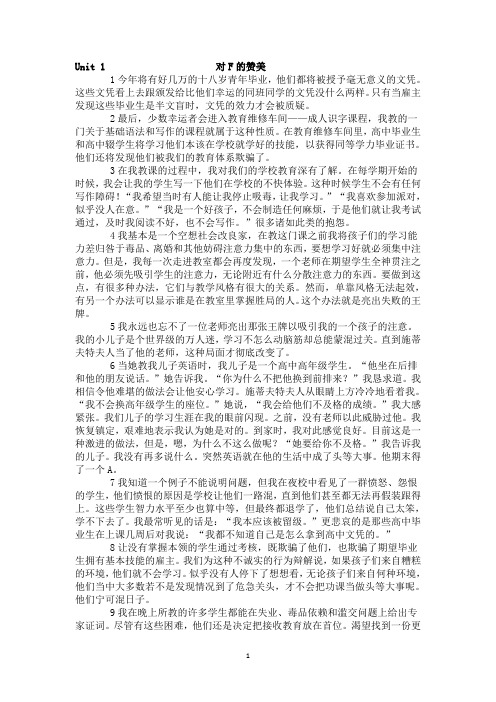
Unit 1 对F的赞美1今年将有好几万的十八岁青年毕业,他们都将被授予毫无意义的文凭。
这些文凭看上去跟颁发给比他们幸运的同班同学的文凭没什么两样。
只有当雇主发现这些毕业生是半文盲时,文凭的效力才会被质疑。
2最后,少数幸运者会进入教育维修车间——成人识字课程,我教的一门关于基础语法和写作的课程就属于这种性质。
在教育维修车间里,高中毕业生和高中辍学生将学习他们本该在学校就学好的技能,以获得同等学力毕业证书。
他们还将发现他们被我们的教育体系欺骗了。
3在我教课的过程中,我对我们的学校教育深有了解。
在每学期开始的时候,我会让我的学生写一下他们在学校的不快体验。
这种时候学生不会有任何写作障碍!“我希望当时有人能让我停止吸毒,让我学习。
”“我喜欢参加派对,似乎没人在意。
”“我是一个好孩子,不会制造任何麻烦,于是他们就让我考试通过,及时我阅读不好,也不会写作。
”很多诸如此类的抱怨。
4我基本是一个空想社会改良家,在教这门课之前我将孩子们的学习能力差归咎于毒品、离婚和其他妨碍注意力集中的东西,要想学习好就必须集中注意力。
但是,我每一次走进教室都会再度发现,一个老师在期望学生全神贯注之前,他必须先吸引学生的注意力,无论附近有什么分散注意力的东西。
要做到这点,有很多种办法,它们与教学风格有很大的关系。
然而,单靠风格无法起效,有另一个办法可以显示谁是在教室里掌握胜局的人。
这个办法就是亮出失败的王牌。
5我永远也忘不了一位老师亮出那张王牌以吸引我的一个孩子的注意。
我的小儿子是个世界级的万人迷,学习不怎么动脑筋却总能蒙混过关。
直到施蒂夫特夫人当了他的老师,这种局面才彻底改变了。
6当她教我儿子英语时,我儿子是一个高中高年级学生。
“他坐在后排和他的朋友说话。
”她告诉我。
“你为什么不把他换到前排来?”我恳求道。
我相信令他难堪的做法会让他安心学习。
施蒂夫特夫人从眼睛上方冷冷地看着我。
“我不会换高年级学生的座位。
”她说,“我会给他们不及格的成绩。
- 1、下载文档前请自行甄别文档内容的完整性,平台不提供额外的编辑、内容补充、找答案等附加服务。
- 2、"仅部分预览"的文档,不可在线预览部分如存在完整性等问题,可反馈申请退款(可完整预览的文档不适用该条件!)。
- 3、如文档侵犯您的权益,请联系客服反馈,我们会尽快为您处理(人工客服工作时间:9:00-18:30)。
Unit Five Conversion ApproachI. Conversion into Chinese verbA. Convert English noun into Chinese verba. convert English common noun into Chinese verb1.We are enemies of all wars.2. Differences between the social systems of countries shall not be an obstacle to their approachment and co-operation.3. Electric power became the servant of man only after the motor was invented.4.一想到能获得奖学金, 他很兴奋激动。
b. convert English noun implying the sense of action that is converted from English verb into Chinese verb1. The use of computer makes our life more convenient.2. They give the winning team one more cheer at the close of the football game.3.The war in Iraq is a drain on American resources4. He made no mention of the car accident.5.我一见这个女孩就想起她的母亲.6.从我们学校可以看到辽阔的大海.Phrases: have a look (rest, walk, chat etc)c. convert English noun derived from verb+ion, ance, al, ment, etc into Chinese verb1. An acquaintance with the modern Chinese history is helpful to the study of Chinese revolution.2. The government called for the establishment of more technical schools.3. No violation of this rule can be tolerated.4. His exclusion from the club hurt him very much.5. More troops have been sent to their rescue (protection).6.The existing law gives no legal approval to divorce a man from his pregnant wife.7.我建议你采取一些措施。
My suggestion is thatd. convert English verb+er into Chinese verb1. I am a good singer (skier, player, lier, listener, learner, …)2. I am no smoker (a chain smoker, a heavy smoker, a two-pack-a-day smoker, drinker).3. I am a great admirer of Jay Joe.4.He is not an easy writer.5.他酷爱流行音乐.6班上的同学很喜欢阅读.B. Convert English preposition into Chinese verb1. We are all for (against) the plan.2. Who are you after?3. The people are with him.4. The Red Army men marched on bravely against the piercing wind.5.It is our sacred duty to support their just struggle for national liberation.6.The whole country is helping the western regions off poverty.7.中国经历了一系列艰苦的变革和实验.C. Convert English adjective into Chinese verb1. He was unaware of my presence.2. I am quite ignorant of what they intend to do.3. He is not content with such kind of life.4. The meeting is informative.5. You should not be sensitive about your clothing and food.6. They strive for lower birth rate.7. He is hopeful that he will visit China again.8.约翰十分熟悉这机器的性能.9.他们太坚信自己的意见了.10.我们怀疑他是否能负担得起昂贵的学费.D. Convert English adverb into Chinese verb1.What will be on tonight?2.When crops are in, they start autumn sowing.3.The meeting is two days away.4.The oil in the tank has been up.5. 请开门让我进去.II. Conversion into Chinese nounA. Convert English verb derived from noun to Chinese noun1.Malaria is characterized by periodic chills.2.Tortoises symbolize longevity.3.Satan personified the evil that was in the world.4.Many average people had been victimized in the terrorist attack.B. Convert English verb that is converted from noun into Chinese noun1. He lunched me well at a restaurant.2.The police aimed at catching the murderer.3.The audience laughed the speaker down.4.The visiting guests were escorted to Kaiyuan TempleC. Convert English adjective into Chinese nounThe old (poor, rich, young, unemployed…)1.The old contract would be good for ten years.2.We show a sympathetic understanding of their misfortune.3.Nylon is nearly twice as strong as natural silk.D. Convert English adverb into Chinese noun1.Originally he is from Shanghai.2.He is physically weak but mentally sound.3.However, they have not done so well ideologically as organizationally4.The paper said editorially that it’s significant for China to send taikonaut to the space.5.It was officially announced that the magistrate was taken into custody.III. Conversion into Chinese adjectiveA. convert English noun derived from adjective to Chinese adjective1.I deeply believe in the correctness of my decision.2.The rolled-up sleeves reveal the snow of her arms.3.We are immensely impressed by the splendor and warmth of our reception at the Great Hall of the People.4.Few Chinese people like the privacy of villas.5.It’s therefore necessary to see the feasibility and effectiveness of this kind of management.B. convert some English nouns with “a” used as predicative into Chinese adjective1.The attack was a success.2.Independent thinking is an absolute necessity in study3.经过学校的门口, 也改换了名称和模样, 于我很生疏.(鲁迅《在酒楼上》)C. convert English adverb that is converted from adjective into Chinese adjective(verb+adverb structure)1.The president had prepared meticulously for his journey.2.Our proposal was warmly welcomed by all the representatives.3. The teacher commented favorably on your achievement .4. The girl impressed her fiance’s relatives favorably with her vivacity and sense of humor.5.他的讲演给听众的印象很深.6.对这个问题, 不同年龄的人有不同的想法.IV.Conversion into Chinese adverb .A .convert English adjective into Chinese adverb(adjective+noun structure)1. He drew a deep breath.2. There is a steady increase in production.3.我国政府十分关心海外华侨4.你拨错了号码B. convert English noun into Chinese adverb.1. I’ve the honor to inform you that your application has been accepted.2. He drew back by instinct .3. I had the fortune to meet him.4.He had the kindness to show me the way .Translation Practice G1. She was a regular contributor to the magazine.2. The pallor of her face indicated clearly how she was feeling at the moment.3. The sight and sound of jet planes filled me with special longing.4. The old man was the forgiver of the young man’s past wrong doings.5. He was between sheets by ten6.. The worker put in a demand for higher wages.7. My families are all early risers.8. She was over some paper work.9. Here is a family of huggers and criers.10. The promotion of working efficiency characterized the Industrial Revolution.11. The English are known as doers rather than thinkers, writers rather than painters, gardeners rather than cooks.12. He was a clever man, a pleasant companion, a careless student, with a great propensity for running into debt and a partiality for the tavern.13. .网络的特点是信息传播快。
